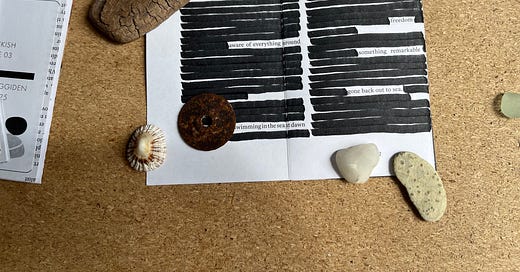She naturally talks softly, aware of everything around her, She has been swimming in the sea at dawn each morning. It is something – freedom, something remarkable; gone back out to sea, buried at sea, disappearing. There is another way of knowing the world. There is another way of living. I think we’ve got a lot to learn.
The tideline
I have been playing with 'blackout poetry’ for this month’s zine – if you’re a paying subscriber, your copy is winging its way to you in the post as we speak and, this time, every single one is unique. If not, sign up for next month’s zine for just £6 a month.
The earliest known examples of this form were by Benjamin Franklin’s neighbour, Caleb Whiteford. It resurfaced again with the Dadaists and the Beat Poets in the early 20th century and more recently in Austin Kleon’s 2010 collection Newspaper Blackout. I found it a fun way to work from an external starting point and come up with unexpected phrases such as ‘Hope is small stones and pebbles in your hand’ and a ‘lovingly tied box of sun.’ I’m definitely going to play with this form some more.
I am a spoken word poet, a craft, design and sustainability writer, and a nature-informed coach and facilitator – and right now I am running a workshop called Cultivating Hope. If world events have got you feeling stuck in ‘fight, flight or freeze' mode, learn how to get unstuck and back into action that feels aligned with your joy. You can either attend in person in Cornwall on Wednesday 07 May, or sign up for a self-paced online version.






I like this poem. Yes to other ways of knowing and living. I had not heard of 'blackout poetry' until now. Thank you.